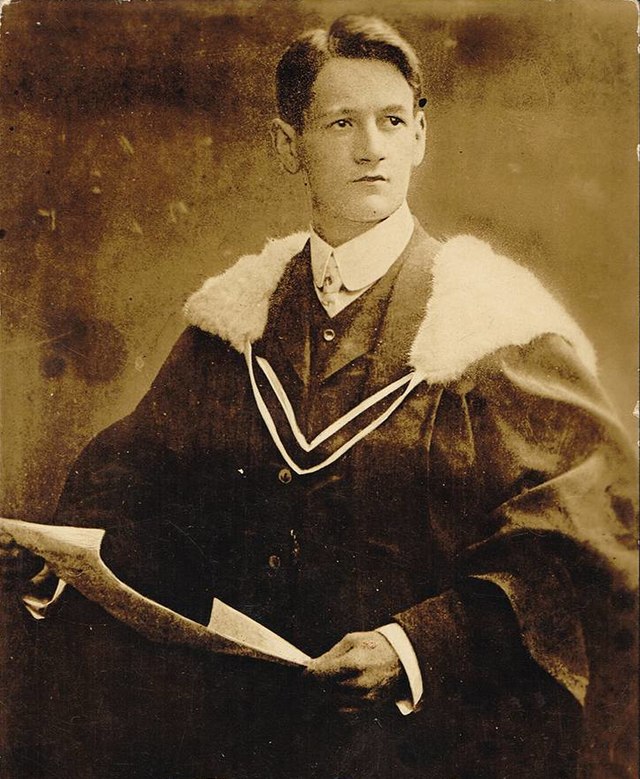The annual Terence MacSwiney London Commemoration will take place at 2pm on Sunday, October 27 outside Brixton Prison.
The keynote speaker is John McDonnell MP
 Terence MacSwiney (image in public domain)
Terence MacSwiney (image in public domain)TERENCE MACSWINEY, Lord Mayor of Cork, died in Brixton jail after 74 days on hunger strike on October 25, 1920. His death made headlines round the world.
A prominent Irish nationalist, playwright, author and political thinker, he became a symbol of resistance against British rule in Ireland,
MacSwiney had a very significant impact on Irish nationalism — as well as the broader international movement for self-determination in the early 20th century.
His death reverberated across the world, bringing the Irish fight for independence to international attention. He encouraged others fighting the shackles of colonialism to continue their struggle, and made the British presence in Ireland close to untenable.
Early life and background
Terence James MacSwiney was born on March 28, 1879, in Cork City, to an Irish father and a mother of Irish and English descent. His father, John MacSwiney, was a schoolteacher and passionate nationalist, and his mother, Mary Wilkinson, an advocate for education and Irish culture. Terence grew up in a politically conscious family environment that would shape his later activism. The MacSwiney family experienced significant financial difficulties, which led to the early death of John MacSwiney when Terence was only a child. These struggles likely reinforced his deep commitment to social justice and nationalism.
Terence MacSwiney attended Christian Brothers School and then moved on to the Royal University of Ireland. Though his formal education was interrupted by the need to work and support his family, MacSwiney maintained a lifelong commitment to learning. He was particularly drawn to the study of Irish history and culture, which would later feature prominently in his political activism and writings.
Political activism and literary career
MacSwiney greatly identified with the growing cultural nationalist movement in Ireland which sought to revive Irish language, literature and culture. He was involved in organisations such as the Gaelic League.
As the political landscape in Ireland became more polarised in the early 20th century, particularly after the 1916 Easter Rising, MacSwiney grew increasingly involved in militant republicanism. He joined the Irish Republican Brotherhood (IRB) and later the Irish Volunteers.
The First Dáil and Lord Mayor of Cork
In 1918, MacSwiney was elected Sinn Féin Member of Parliament for Cork City, although all Sinn Féin members refused — and continue to refuse — to take their seats in Westminster. Instead, they formed the First Dáil in 1919, declaring Ireland's independence from Britain. MacSwiney played an active role in this new political body.
The following year, in 1920, MacSwiney became the Lord Mayor of Cork after the previous Lord Mayor, Tomás Mac Curtain, was killed by the Black and Tans. Within days of martial law being imposed by the British in Cork, MacSwiney was arrested.
Arrest and hunger strike
Following his arrest by British forces, MacSwiney was charged with possession of seditious documents and involvement in the Irish Volunteers. Following a hastily arranged military court trial, he was sentenced to two years of imprisonment in Brixton Prison.
MacSwiney refused to recognise the authority of the court.
In protest against his imprisonment and as a challenge to British rule, he began a hunger strike. His decision was deeply rooted in the Irish republican tradition, which viewed hunger strikes as a valid and potent form of protest against the injustice of British rule.
The British government, led by Prime Minister David Lloyd George, refused to yield to MacSwiney's demands. Despite growing international pressure, particularly from the United States, the British authorities maintained that they would not release MacSwiney. Over the course of his hunger strike, MacSwiney became an international cause célèbre. His plight was covered extensively in the global press, and figures such as Mahatma Gandhi, involved in his own anti-colonial struggle, expressed solidarity with him.
The organising committee of the commemoration
THE Terence MacSwiney Committee was started by a small group of Irish history enthusiasts and political activists who began to organise commemorations and historical talks, in London, to coincide with the centenary of the Easter Rising in 2016. The Committee is dedicated to preserving and commemorating the memory and of Terence MacSwiney.
The committee also supports international solidarity in support of other nations struggling for freedom and independence, reiterating MacSwiney’s immortal words: "It is not those who can inflict the most but those who can endure the most who will conquer."
As well as the annual commemoration for Terence MacSwiney, the committee also commemorates other Irish patriots with a connection to London and/or England
Chairperson Frank Glynn says: “We are made up entirely of volunteers and any costs are carried by our members. Anyone interested in getting involved in our work or lending their support can reach us at: [email protected] “

